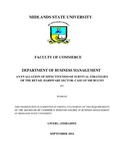Please use this identifier to cite or link to this item:
https://cris.library.msu.ac.zw//handle/11408/2371| Title: | An evaluation of survival strategies for the retail hardware sector: Case of Shurugwi. | Authors: | Manhiwa, Thelma E. R. | Keywords: | Retailing Retail hardware sector |
Issue Date: | Oct-2014 | Publisher: | Midlands State University | Abstract: | The study sought to evaluate the effectiveness of the survival strategies employed by the retail hardware sector in Shurugwi, Zimbabwe. The objectives of this study was to establish the challenges faced by SMEs, to establish survival strategies used by SMEs and to establish alternative survival strategies that can be used by SMEs in the retail hardware sector. Descriptive research design was used to provide further insight into the research problem by describing variables of interest. The targeted population consisted of 54 participants.A census sampling technique had 54 participants and was precise, detailed and gave data in great detail for the small domains especially the local areas. The study examined the challenges currently being faced by small businesses for example lack of business experience, owner manager characteristics, knowledge management, stringent procedures to acquire a loan, financial management, lack of ICT, reduced availability of finance, limited information about financing options, political instability, operational space and locational changes, supply chain, Lack of business networks, increasing competition, lack of human resource and lack of customer relationship management systems. The survival strategies were cost reduction, product diversification and payment terms in credits. Pricing strategies, collaboration, buyer-supplier relationship, networking and market segmentation.The alternative strategies were strategic partnership, internationalisation, compliance, temporary closures, promotions, localisation, partnerships, promotions, mergers and advertising. The findings of the study stated that there is a relationship on business experience and performance, business experience and turnover, business age and turnover, respondents’ age and performance, education and performance, gender and performance and business review and performance. The challenges which affected SMEs the most was lack of business networks. Survival strategy most implemented is collaboration and the alternative survival strategy implemented is temporary closures. The strategies used yielded negative results and are not effective. This is so because the numbers of retail outlets have decreased and their profits have also decreased. It also shows that survival itself is a struggle in the sector. The recommendations were that Zimbabwean government’s economic initiatives to be easily reached and accessible. In addition the government is to provide entrepreneurship training and educational schemes. Ministry of SMEs is to introduce career development schemes and also development female entrepreneurship development models. | URI: | http://hdl.handle.net/11408/2371 |
| Appears in Collections: | Bachelor Of Commerce Business Management Honours Degree |
Files in This Item:
| File | Description | Size | Format | |
|---|---|---|---|---|
| Manhiwa.pdf | Full text | 1.05 MB | Adobe PDF |  View/Open |
Page view(s)
210
checked on Apr 18, 2025
Download(s)
140
checked on Apr 18, 2025
Google ScholarTM
Check
Items in MSUIR are protected by copyright, with all rights reserved, unless otherwise indicated.



